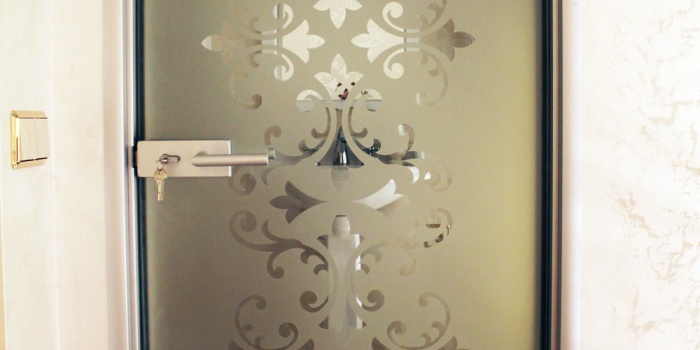
Glass doors are one of the most effective ways to give a completely different design to any room. Unlike other materials, glass doors allow natural light to pass through and create a feeling of openness and spaciousness. In addition, one of the main advantages of glass is that, thanks to its extremely smooth surface, it is easy to clean and can withstand the test of time without showing signs of aging for years. Another benefit is that laminated glass offers significant sound insulation and can feature different prints on both sides, allowing the design to complement two separate interiors.
There are three main types of glass door opening mechanisms: swing (hinged), sliding, and folding (accordion style). Each type has its advantages and disadvantages, so choosing the right one for your space is essential.
This is the most common type of door—not only for glass but also for aluminum, wood, and other materials. A downside of this type is that in smaller rooms, you need to account for the space required for opening and closing. However, in larger rooms, it remains one of the most popular options. The hardware for swing glass doors varies, but the two main systems are:
A floor spring mechanism (commonly used in shops, banks, and public buildings), or
Wall-mounted or glass-to-glass hinges.
Glass door in a frame
The biggest advantage of sliding glass doors is space-saving, as they don't require clearance to swing open. For this reason, they are increasingly preferred for shower enclosures, interior doors, and office partitions. In addition to being functional, sliding glass doors are often very elegant and add a sleek touch to any space. They can even be designed to slide into a wall pocket (usually made of plasterboard), completely hiding the door when open.
Sliding glass door
Though less common for interior use, accordion-style glass doors are often a practical solution for shower enclosures, especially where space is limited. This opening mechanism allows for the doors to fold neatly, freeing up maximum space when open.
Folding (accordion) glass door
As a company with over 25 years of experience in glass processing, we proudly call ourselves a manufacturer of custom glass doors. We offer a wide range of finishing options to help you achieve the design you're envisioning. One option is ceramic printing, where the ink is fired into the glass during tempering, making it an integral part of the glass surface. This process makes the print suitable for moist environments, outdoor use, and wet rooms. You can fully customize the look—whether you prefer solid color printing, delicate patterns, or semi-transparent shapes, the choice is yours. Printed glass doors offer a luxurious and designer-worthy finish.
Beyond printing, we can offer something truly unique—handcrafted textured (relief) glass. This is created through a process called fusing, in which the glass is heated to high temperatures, making it malleable. The result is a textured surface that can have varying degrees of transparency, depending on the desired effect. This technique turns the glass door into not only a functional piece but also an artistic and one-of-a-kind element in your space.
Glass door for bathroom
One of the most popular and trending designs today is framing the glass with black or gold profiles, along with matching black or gold hardware for a refined, modern finish.
The price of a glass door depends on several factors:
The type of glass
The design and customization
The door dimensions
The hardware selection (hinges, profiles, handles, etc.)
Whether installation is included or not
The most basic option includes an 8mm tempered glass door with standard hardware (black, gold, or other finishes can be added as extras). You can also choose to add ceramic printing, decorative framing, laminated glass, textured designs, and more.